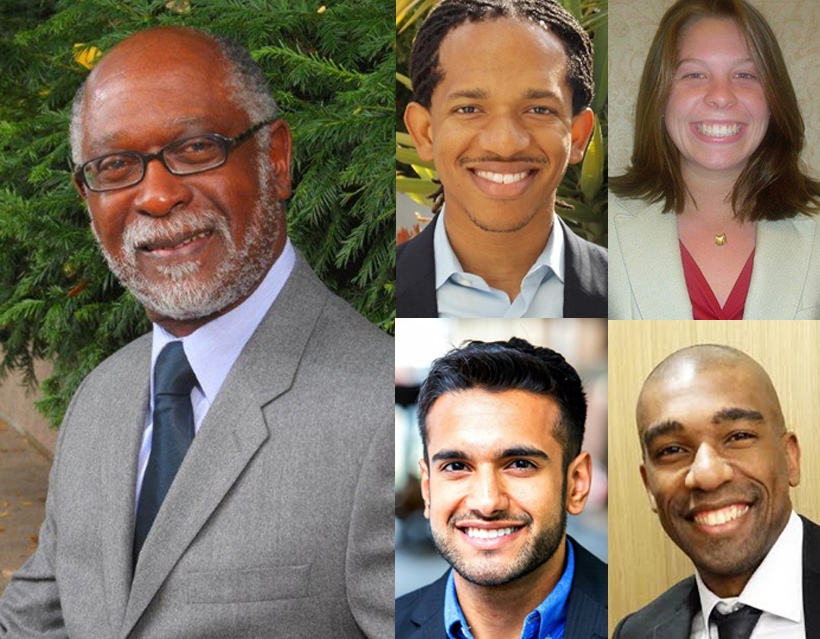News
Pointing out Hurdles: Advisors, peers ease Pickering Fellows’ Foreign Service transition
One of the greatest challenges for new Fellows in the Thomas R. Pickering Foreign Affairs Fellowship is making the shift from student to professional Foreign Service Officer.
“The transition is not an obvious one,” says Ambassador James I. Gadsden, Senior Counselor for the Pickering Foreign Affairs Fellowship Program at the Woodrow Wilson National Fellowship Foundation.
A strong mentoring program can be key to Fellows’ professional success in the U.S. Department of State Foreign Service. The Fellows receive several kinds of mentoring, from general sessions to individual peer guidance and networking with more senior officers, and are encouraged to draw on these contacts.
To begin, each new class of Fellows attends a series of professional skills development workshops with Ambassador Gadsden. During these Thursday night summer sessions, the Fellows work on mastering the profession’s culture, developing their written and oral communication skills, choosing career paths, and preparing for the Foreign Service Officer Tests. Fellows also have an assigned mentor, usually a Fellow from previous years, to help them learn the nuances of work and life in the State Department.
“We all reach out to each other to better inform ourselves of the various procedures and policies,” says Michelle Kayser, a 2006 Pickering Undergraduate Fellow and mentor. “I feel incredibly grateful to the Thomas R. Pickering Foreign Affairs Fellowship program and all the opportunities with which it has provided me. I’ve been very fortunate to have some great supervisors and mentors in the Department of State.”
One of the keys is building a strong network. Salman Haji, a 2013 Pickering Undergraduate Fellow, started making connections during his first summer internship in Washington, DC. “My mentor regularly corresponded with me regarding contacts I could become acquainted with during the summer,” says Mr. Haji. “This was an excellent way to understand the backgrounds of people in his network and gain a wider perspective about the types of diverse duties performed within the broad field of U.S. foreign policy.”
Mr. Haji’s mentor is 2007 Pickering Undergraduate Fellow Victor Marsh. “I’ve been a huge beneficiary of mentorship, and I want to make sure that I am doing something useful for others,” says Mr. Marsh.
The Pickering program’s combination of mentoring and internships, Mr. Marsh says, helps Fellows learn from both peers and higher-level officers about all aspects of life in the State Department, which helps them develop into better Foreign Service Officers.
“[Mr. Marsh] has given me advice about everything from what to look for in a graduate school to excelling as an intern at the Department of State,” says Mr. Haji of his mentor.
The mentoring relationships also give Fellows someone to talk with about how to hit their stride on their new career path. Mr. Haji says, for example, that Mr. Marsh helped him think about work/life balance while preparing to become a Foreign Service Officer.
2011 Graduate Fellow Jullion Cooper, also mentored by Mr. Marsh, had a long list of the ways his Pickering mentoring relationships helped him succeed as a Foreign Service Officer. One of his greatest takeaways from this relationship, and his tip for a successful career in the Foreign Service, is to draw on advice from his network—for example, when writing and proofing his employee evaluation.
“I am extremely grateful for the Pickering Fellowship,” says Mr. Cooper. “The mentorship program has been invaluable to me as a professional and as a person.”
The new Fellows aren’t the only ones who benefit from the relationships; both Mr. Marsh and Ms. Kayser find the role to be rewarding and enlightening. “I receive a lot of renewed commitment and energy towards my job, and I am grateful for how fortunate I am to have a career in the Foreign Service,” says Ms. Kayser. “It is humbling to see the impressive resumes of these soon-to-be Officers. It reminds me why this is such an amazing career.”
Ambassador Gadsden closes his workshops by introducing career tracks and the performance evaluation processes. He tells Fellows that, in order to become the best possible Foreign Service Officer, they should “make a plan. Don’t cement the plan and encase it in steel, but at least have a general idea of where you want to go and how you think you’d like to get there.”
###
This story appeared in our Spring 2015 newsletter. To view the full newsletter online, click here.


